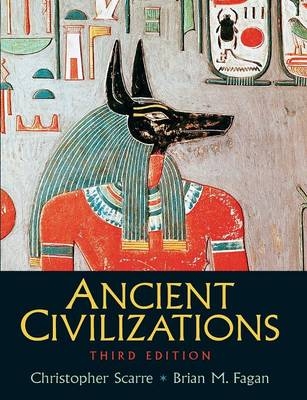
Ancient Civilizations
Routledge (Verlag)
978-0-13-192878-7 (ISBN)
- Titel erscheint in neuer Auflage
- Artikel merken
Drawing on many avenues of inquiry: archaeological excavations, surveys, laboratory work, highly specialized scientific investigations, and on both historical and ethnohistorical records; Ancient Civilizations, 3/e provides a comprehensive and straightforward account of the world’s first civilizations and a brief summary of the way in which they were discovered.
Chris Scarre is an archaeologist specializing in the prehistory of Europe and the Mediterranean, with a particular interest in the archaeology of Atlantic façade (Iberia, France, Britain, and Ireland). He took his MA and PhD at Cambridge, the latter a study of landscape change and archaeological sites in western France. He has participated in fieldwork projects in Britain, France, and Greece and has directed excavations at Neolithic settlement and mortuary sites in western France. His early work was published in Ancient France. He is currently Deputy Director of the McDonald Institute for Archaeological Research, University of Cambridge, and editor of the twice-yearly Cambridge Archaeological Journal. As a Fellow of Girton College, Cambridge, he teaches a wide range of archaeological subjects from early stone use in the Paleolithic to the expansion of the Roman Empire. His research interests include the relationship of prehistoric monuments to their landscape setting, the use of color in prehistoric societies, and the development and character of early state societies. Recent papers have considered the meanings that prehistoric societies may have attached to natural landscape features in Brittany, and the manner in which those meanings were given material expression through the construction of burial mounds or settings of standing stones. The nature of early farming societies along the Atlantic façade in relation to theories of demographic displacement is reviewed in a number of articles published since 1992. His latest field project is the excavation (together with French colleagues) of a prehistoric burial mound at Prissé-la-Charrière in western France. As Deputy Director of the McDonald Institute he is involved with the wider research programs of the Institute that include field projects in Europe and the Middle East and laboratories specializing in the analysis of faunal and botanical remains. Brian Fagan is one of the leading archaeological writers in the world and an internationally recognized authority on world prehistory. He studied archaeology and anthropology at Pembroke College, Cambridge University, and then spent seven years in sub-Saharan Africa working in museums and in monument conservation and excavating early farming sites in Zambia and East Africa. He was one of the pioneers of multidisciplinary African history in the 1960s. From 1967 to 2003, he was Professor of Anthropology at the University of California, Santa Barbara, where he specialized in lecturing and writing about archaeology to wide audiences. He is now Emeritus. Professor Fagan has written six best-selling textbooks apart from this book: Ancient Lives: An Introduction to Archaeology; In the Beginning; Archaeology: A Brief Introduction; People of the Earth; World Prehistory, all published by Prentice Hall–that are used around the world. His general books include The Rape of the Nile, a classic history of Egyptology; The Adventure of Archaeology; Time Detectives; Ancient North America; The Little Ice Age, The Long Summer, andFish on Friday. He is General Editor of the OxfordCompanion to Archaeology. In addition, he has published several scholarly monographs on African archaeology and numerous specialized articles in national and international journals. He is also an expert on multimedia teaching and has received the Society for American Archaeology’s first Public Education Award for his indefatigable efforts on behalf of archaeology and education. Brian Fagan’s other interests include bicycling, sailing, kayaking, and good food. He is married and lives in Santa Barbara with his wife and daughter, four cats (who supervise his writing), and, last but not least, seven rabbits.
Part I: Background.
Chapter 1: The Study of Civilization
Chapter 2: Theories of States
Part II: The First Civilizations
Chapter 3: Mesopotamia: The First Cities (3500-2000 B.C.)
Chapter 4: Egyptian Civilization
Chapter 5: South Asia: Harappan and Later Civilizations
Chapter 6: The First Chinese Civilizations
Part III: Great Powers in the Near East
Chapter 7: Near Eastern Kingdoms (2000-1200 B.C.)
Chapter 8: The Near East in the First Millennium B.C.
Part IV: The Mediterranean World:
Chapter 9: The Mediterranean World in the First Millennium (1000-30 B.C.)
Chapter 10: The First Aegean Civilizations
Chapter 11: Imperial Rome
Part V: Northeast Africa and Asia
Chapter 12: Divine Kings in Southeast Asia
Part VI: Early States in the Americas
Chapter 13: Lowland Mesoamerica
Chapter 14: Highland Mesoamerica
Chapter 15: The Foundations of Andean Civilization
Chapter 16: Andean States (200 B.C.-A.D. 1534)
Chapter 17: Epilogue
| Erscheint lt. Verlag | 7.9.2007 |
|---|---|
| Verlagsort | New York |
| Sprache | englisch |
| Maße | 178 x 235 mm |
| Gewicht | 789 g |
| Themenwelt | Geschichte ► Allgemeine Geschichte ► Vor- und Frühgeschichte |
| ISBN-10 | 0-13-192878-3 / 0131928783 |
| ISBN-13 | 978-0-13-192878-7 / 9780131928787 |
| Zustand | Neuware |
| Haben Sie eine Frage zum Produkt? |
aus dem Bereich



